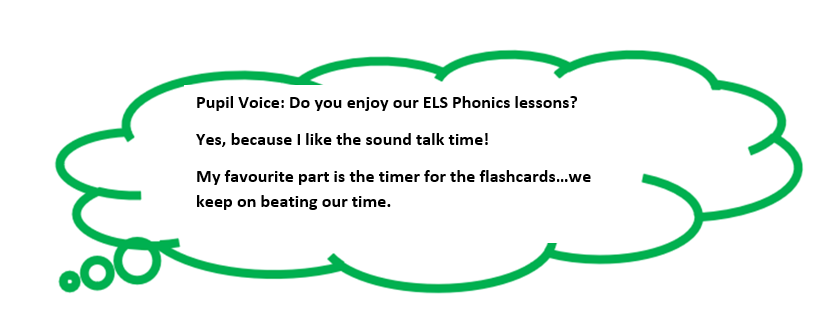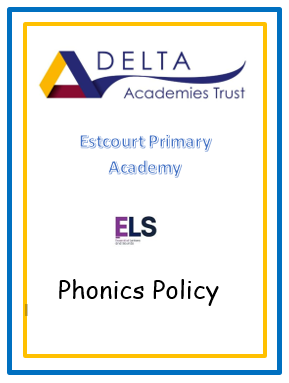Phonics and Early Reading
At Estcourt Primary Academy we strive for all children to become confident, fluent, and passionate readers, quickly. We aim to develop pupils’ reading through progressive phonics teaching, guided reading, home reading and reading strategy teaching, so that children will learn to read widely, fluently, accurately, frequently and with good understanding and pleasure.

Our curriculum is formed by our school vision, which enables all children, regardless of their starting point to exceed and grow into lifelong learners who will make a positive contribution to society.
Intent
• For children to be accurate and fluent readers,
• For children to be confident in their reading of a wide variety of genres,
• For children to not only read well, but understand what they are reading,
• To inspire children with books and encouragement to embed a love of reading and story-telling,
For children to be able to achieve these intentions, we provide them with a consistent and engaging approach of phonic teaching, following Essential Letters and Sounds. We believe every child should leave Estcourt Primary with the skills of an outstanding reader and writer.
The Importance Of Phase One Phonics
From the moment they enter nursery, children are exposed to a variety of sounds throughout the day (environmental and instrumental) with the emphasis on talking and listening. Phase One in Nursery plays a vital role in a child’s introduction to phonics. Alongside Phase One, children are tracked throughout the stages of the current Launchpad to Literacy document which supports developmental increments in all areas relating with speech, language, vocabulary, and phonological awareness.

Daily phonics lessons are taught from Foundation Stage 2 (F2), where children will be introduced to phonemes and graphemes. F2 incorporates Phase 2-4 throughout the year, and they are introduced to phase 5 in the summer term. They will develop their ability to segment and blend phonemes together to say a word. Opportunities for reading are provided through daily ELS fluency sessions and endless opportunities for children to practice and apply their learning in provision. Children are provided with fully decodable books that are matched to their ability.






In year 1, these skills are built upon further, where children can revisit prior phases of phonics and learning. Daily phonics sessions continue into year 1 most specifically incorporating phase 5 throughout most of the year. They continue to build upon that by learning alternative spelling and pronunciation. Daily phonics and where appropriate daily interventions are given to children to help them in their reading and writing skills. Phonics plays a hugely important part in year 1 as the statutory Screening Test is taken during this year. Staff work closely with children and parents to provide as many opportunities as possible to revisit and apply their knowledge. We hope that this provides children with the tools to achieve success in their Screening.
Alongside the teaching of phonics in Year 1, the children also have the chance to apply through the daily ELS fluency sessions linked and 1:1 intervention sessions. This session provides opportunities for the children to practice their newly taught phonic skills in context, along with promoting and embedding fluency. Fully decodable books are an integral part of this strategy and are used throughout Foundation Stage and Key Stage 1. Children are provided with the choice to either take their decodable book home that they feel confident reading or using oxford owl online at home to access it, as well as offered a book for pleasure. We want children to leave Year 1 with the confidence to read in a fluent and accurate manner and support our families to achieve this aim. The classroom provision acts as a further supportive tool and is focused on decoding opportunities linked to the children current learning and current gaps in phonics knowledge.



Year 2 consolidates all previous learning and expands upon it once again. Children can practice and revisit their knowledge and apply that to their reading and writing. The emphasis moves towards spellings, homophones, and suffixes. Children are still provided with decodable books when necessary, which helps revisit and maintain good phonetic knowledge and continue to build confidence. At this stage, most children should have passed their phonics screening and have good level of phonetic knowledge to start building up their fluency. Building up fluency is a key focus alongside developing confidence and understanding readers. Every year however there are children who retake the Screening Test in year 2. These children continue with the teaching and learning of phonics with the main class body and supplement this with further interventions to close gaps, specific to their need. These interventions are individual specific and match to specific gaps in learning.

KS2 onwards:
As children move further up school, support with phonics continues. At Estcourt Primary we strive to ensure that children are given the opportunity to continue to practice their skill and phonics knowledge and where appropriate children are still provided with books to match their fluency and understanding. We are extremely fortunate that we are gifted with children from different ethnicities and backgrounds, therefore we respect that English is not always their first spoken language and understand that the process to learning English may take longer than others. With this in mind, we feel it is beneficial to have strategies in place to support those in need.
All key stage 2 phonic interventions are structured in the same way following Essential Letters and Sounds. We have incorporated the non-negotiables from Essential Letters and Sounds within school to ensure that all staff are consistent in their approach when teaching phonics and all members of staff are fully trained.
